- Home
- Naguib Mahfouz
Three Novels of Ancient Egypt Khufu's Wisdom
Three Novels of Ancient Egypt Khufu's Wisdom Read online
CONTENTS
Introduction
Select Bibliography
Chronology
Map of Ancient Egypt
Khufu's Wisdom
Rhadopis of Nubia
Thebes at War
Glossary for Khufu's Wisdom
Translators’ Acknowledgments
INTRODUCTION
‘What matters in the historical novel is not the telling of great historical events, but the poet's awakening of people who figure in those events. What matters is that we should re-experience the social and human motives which led men to think, feel and act just as they did in historical realities.’*
Naguib Mahfouz adds another dimension to what matters. Reading back through his work written over seventy-six years and coming to this trilogy of earliest published novels brings the relevance of re-experience of Pharaonic times to our own. The historical novel is not a mummy brought to light; in Mah-fouz's hands it is alive in ourselves, our twentieth and twenty-first centuries, in the complex motivations with which we tackle the undreamt-of transformation of means and accompanying aleatory forces let loose upon us. Although these three fictions were written before the Second World War, before the atom bomb, there is a prescience - in the characters, not authorial statement - of what was to come. A prescience that the writer was going to explore in relation to the historical periods he himself would live through, in the forty novels which followed.
Milan Kundera has spoken for Mahfouz and all fiction writers, saying the novelist doesn't give answers, he asks questions. The very title of the first work in Mahfouz's trilogy, Khufu's Wisdom, looks like a statement but it isn't, it's a question probed absorbingly, rousingly, in the book. The Fourth-Dynasty Pharaoh, ageing Khufu, is in the first pages reclining on a gilded couch as he gazes into the distance at the thousands of labourers and slaves preparing the desert plateau for the pyramid he is building for his tomb, ‘eternal abode'. Hubris surely never matched. His glance sometimes turns to his other provision for immortality: his sons. And in those two images Mahfouz has already conceived the theme of his novel, the power of pride against the values perhaps to be defined as wisdom. King of all Egypt, North and South, Khufu extols the virtue of power. Of the enemies whom he has conquered, he declares: ‘… what cut out their tongues, and what chopped off their hands … was nothing but power… And what made my word the law of the land… made it a sacred duty to obey me? Was it not power that did all this?’ His architect of the pyramid, Mirabu, adds: ‘And divinity, my lord.’ The gods are always claimed for one's side. If the Egyptians both thanked and blamed them for everything, in our new millennium warring powers each justify themselves with the claim, God is on their side.
Mahfouz even in his early work never created a two-dimensional symbol. For Khufu, contemplating the toilers at his pyramid site, there's an ‘inner whispering’ - ‘Was it right for so many worthy souls to be expended for the sake of his personal exaltation?’ He brushes away this self-accusation and accepts a princely son's arrangement for an entertainment he's told includes a surprise to please him.
There is that intermediary between divine and earthly powers, the sorcerer - representative of the other, anti-divinity, the devil? The surprise is Djedi, sorcerer ‘who knows the secrets of life and death'. After watching a feat of hypnotism, Khufu asks: ‘Can you tell me if one of my seed is destined to sit on the throne of Egypt's kings?’ The sorcerer pronounces: ‘Sire, after you, no one from your seed shall sit upon the throne of Egypt.’ Pharaoh Khufu is sophisticatedly sceptical: ‘simply tell me: do you know whom the gods have reserved to succeed them on the throne of Egypt?’ He is told this is an infant newly born that morning, son of the high priest of the Temple of Ra. Grown Prince Khafra, heir of the Pharaoh's seed, is aghast. But there's a glimpse of Khufu's wisdom, if rationalism is wisdom: ‘If Fate really was as people say… the nobility of man would be debased… No, Fate is a false belief to which the strong are not fashioned to submit.’ Khufu calls upon his entourage to accompany him so that he himself ‘may look upon this tiny offspring of the Fates'.
Swiftly takes off a narrative of epic and intimacy where Mahfouz makes of a youthful writer's tendency to melodrama, a genuine drama. The high priest Monra has told his wife that their infant son is divinely chosen to rule as successor to the god Ra-Atum. The wife's attendant, Sarga, overhears and flees to warn Pharaoh Khufu of the threat. Monra fears this means his divinely appointed son therefore will be killed. He hides mother and new-born with the attendant Zaya on a wagon loaded with wheat, for escape. On the way to the home of the high priest, Khufu's entourage encounters Sarga in flight from pursuit by Monra's men; so Khufu learns the facts of the sorcerer's malediction and in reward orders her to be escorted to her father's home.
When Khufu arrives to look upon the threat to his lineage he subjects the high priest to a cross-examination worthy of a formidable lawyer in court. ‘You are … advanced in both knowledge and in wisdom… tell me: why do the gods enthrone the pharaohs over Egypt?’ ‘They select them from among their [the pharaohs'] sons, endowing them with their divine spirit to make the nation prosper.’ ‘Thus, can you tell me what Pharaoh must do regarding his throne?’ ‘He must carry out his obligations, claim his proper rights.'
Monra knows what he's been led to admit. There follows a scene of horror raising the moral doubt, intellectual powerlessness that makes such over-the-top scenes undeniably credible in Mahfouz's early work. Obey the god Ra or the secular power Khufu? There comes to Monra ‘a fiendish idea of which a priest ought to be totally innocent'. He takes Khufu to a room where another of his wife's handmaidens has given birth to a boy, implying this is his son in the care of a nurse. With the twists of desperate human cunning Mahfouz knows so instinctively, the situation is raised another decibel.
Monra is expected to eliminate his issue. ‘Sire, I have no weapon with which to kill.’ Khafra, Pharaoh's seed, shoves his dagger into Monra's hand. In revulsion against himself the high priest thrusts it into his own heart. Khafra with a cold will (to remind oneself of, much later) has no hesitation in ensuring the succession. He beheads the infant and the woman.
There is another encounter, on the journey back to Pharaoh's palace, another terrified woman, apparently pursued by a Bedouin band. Once more compassionate, Khufu orders that the poor creature with her baby be taken to safety
- she says she was on her way to join her husband, a worker on the pyramid construction. Mahfouz like a master detective-fiction writer, lets us in on something vitally portentous his central character, Khufu, does not know; and that would change the entire narrative if he did. The woman is Zaya. She has saved the baby from a Bedouin attack on the wheat wagon.
Mahfouz's marvellous evocation, with the mid-twentieth-century setting of his Cairo trilogy,* of the depth of the relationship between rich and aristocratic family men and courtesans, pimps, concurrent with lineal negotiations with marriage brokers, exemplifies an ignored class interdependency. His socialist convictions that were to oppose, in all his work, the posit that class values, which regard the lives of the ‘common people’ as less representative of the grand complex mystery the writer deciphers in human existence, begins in this other, early trilogy. The encounter with Zaya moves his story from those who believe themselves to be the representatives of the gods, to the crowd-scene protagonists in life. The servant Zaya's desolation when she learns her husband has died under the brutal conditions of pyramid labour, and the pragmatic courage of her subsequent life devotedly caring for baby Djedef, whom she must present as her own son, opens a whole society both coexistent with and completely remote from the awareness of the Pharaoh, whose
desire for immortality has brought it about. The families of his pyramid workers have made in the wretched quarter granted them outside the mammoth worksite Pharaoh gazed on, ‘a burgeoning, low-priced bazaar'. There Djedef grows to manhood.
Zaya, one of Mahfouz's many varieties of female beauty, has caught the eye of the inspector of the pyramid, Bisharu, and does not fail to see survival for herself and the child in getting him to marry her. Mahfouz's conception of beauty includes intelligence, he may be claimed to be a feminist, particularly when, in later novels he is depicting a Muslim society where women's place is male-decreed. This is a bold position in twentieth-century Egypt, though nothing as dangerous as his criticism, through the lives of his characters, of aspects of Islamic religious orthodoxy that brought him accusations of blasphemy and a near-fatal attack by a fanatic. Djedef chooses a military career; his ‘mother’ proudly sees him as a future officer of the Pharaoh's charioteers. While his putative father asks himself whether he should continue to claim this progeniture or proclaim the truth? Pharaoh Khufu has been out of the action and the reader's sight; almost seems the author has abandoned the subject of Khufu's wisdom. But attention about-turns momentously.
As Djedef rises from rank to rank in his military training, Pharaoh has the news from his architect: the pyramid is completed, ‘for eternity… it will be the temple within whose expanse beat the hearts of millions of your worshippers'. Fulfilment of Khufu's hubris? Always the unforeseen, from Mahfouz. Khufu has gone through a change. He does not rejoice and when Mirabu asks ‘What so clearly preoccupies the mind of my lord?', comes the reply, ‘Has history ever known a king whose mind was carefree? … Is it right for a person to exult over the construction of his grave?’ As for the hubris of immortality: ‘Do not forget… the fact that immortality is itself a death for our dear, ephemeral lives… What have I done for the sake of Egypt? … what the people have done for me is double that which I have done for them.’ Khufu has decided to write ‘a great book', ‘guiding their souls and protecting their bodies’ with knowledge. The place where he will write it is the burial chamber in his pyramid.
Mahfouz puts Khufu's wisdom to what surely is the final test: attempted parricide when Khafra's professed love for his father is shown to mask an impatience to inherit the throne. This horror is foiled only by another: Djedef killing Khufu's own seed, Khafra. What irony in tragedy conveyed by vivid scenes of paradox: it is the sorcerer's pronouncement that is fulfilled, not the hubris of an eternal abode. Djedef of divine prophecy is declared future pharaoh, after a moving declaration by a father who has seen his own life saved - only by the death of his son. He calls for papyrus: ‘that I may conclude my book of wisdom with the gravest lesson that I have learned in my life'. Then he throws the pen away. With it goes the vanity of human attempt at immortality; Khufu's wisdom attained.
*
The second novel of the trilogy opens in Hollywood if not Bollywood flamboyance with the festival of the flooding of the Nile. The story has as scaffold a politico-religious power conflict within which is an exotic exploration of that other power, the sexual drive.
This is an erotic novel. A difficult feat for a writer; nothing to do with pornography, closer to the representation of exalted states of being captured in poetry. The yearly flooding of the Nile is the source of Egypt's fertility, fecundity, source of life, as is sexual attraction between male and female.
There are two distractions during the public celebrations before the Pharaoh; omens. A voice in the throng yells ‘Long live His Excellency Khnumhotep’ and the young Pharaoh is startled and intrigued by a woman's golden sandal dropped into his lap by a falcon. The shout is no innocent drunken burst of enthusiasm for the prime minister. It is a cry of treason. The sandal isn't just some bauble that has caught the bird of prey's eye, it belongs to Rhadopis.
The Pharaoh, ‘headstrong… enjoys extravagance and luxury, and is as rash and impetuous as a raging storm', intends to take from the great establishment of the priesthood, representative of the gods who divinely appoint pharaohs, the lands and temples whose profits will enable him to construct palaces. His courtiers are troubled: ‘It is truly regrettable that the king should begin his reign in confrontation.’ ‘Let us pray that the gods will grant men wisdom… and forethought.’ His subjects in the crowd are excitedly speculating about him. ‘How handsome he is!’ His ancestors of the Sixth Dynasty ‘in their day, how those pharaohs filled the eyes and hearts of their people'. “I wonder what legacy he will bequeath?'
A beautiful boat is coming down the Nile from the island of Biga. ‘It is like the sun rising over the eastern horizon.’ Aboard is ‘Rhadopis the enchantress and seductress… She lives over there in her enchanting white palace … where her lovers and admirers head to compete for her affections.'
No wonder Mahfouz later wrote successful film scripts; already he knew the art, the flourish, of the cut. Rhadopis of Nubia is the original femme fatale. The ravishing template. Not even descriptions of Cleopatra can compare. The people gossip: enthralled, appalled, ‘Do you not know that her lovers are the cream of the kingdom?'; spiteful, ‘She's nothing but a dancer … brought up in a pit of depravity… she has given herself over to wantonness and seduction'; infatuated, ‘Her wondrous beauty is not the only wealth the gods have endowed her with … Thoth [god of wisdom] has not been mean with wisdom and knowledge'; sardonic, ‘To love her is an obligation upon the notables of the upper classes, as though it were a patriotic duty.'
Mahfouz is the least didactic of writers. He's always had nimble mastery of art's firm injunction: don't tell, show. Overhearing the talk one's curiosity is exhilaratingly aroused as if one were there among the crowd, even while unnoticingly being informed of themes that are going to carry the narrative.
Prime minister Khnumhotep favours, against the Pharaoh's intent, the priests’ campaign to claim their lands and temples as inalienable right. The bold challenge of calling out his minister's name on a grand public occasion has hurt and angered the Pharaoh; his chamberlain Sofkhatep and Tahu, commander of the guards, are concerned. There's juxtaposed another kind of eavesdrop, on an exchange between these two which goes deeper than its immediate significance, dispute over the priests’ possessions. Tahu urges Pharaoh, ‘Force, my lord… Do not procrastinate … strike hard.’ Sofkhatep, ‘My lord… the priesthood is dispersed throughout the kingdom as blood through the body… Their authority over the people is blessed by divine sanction… A forceful strike might bring undesired consequences.’ Pharaoh chillingly responds, ‘Do not trouble yourselves… I have already shot my arrow.’ He has had brought to him the man who cried out, told him his act was despicable, awed him with the magnanimity of not ordering him punished, declaring it ‘simple-minded to think that such a cry would distract me from the course I have set upon … I had decided irrevocably … that from today onward nothing would be left to the temples save the land and offerings they need.'
Something that does distract the young Pharaoh from problems of his reign is the fall from the blue - the gold sandal. Sofkhatep remarks that the people believe the falcon courts beautiful women, whisks them away. Pharaoh is amazed: the token dropped in his lap is as if the bird ‘knows my love for beautiful women'. The gold sandal is Rhadopis's, recognized by Sofkhatep. Tahu seems perturbed when Pharaoh asks who she is; a hint dropped of a certain circumstance that will give him an identity rather different from official one of general. He informs that she is the woman on whose door distinguished men knock. Sofkhatep adds, ‘In her reception hall, my lord, thinkers, artists, and politicians gather … The philosopher Hof … has remarked… the most dangerous thing a man can do in his life is to set eyes upon the face of Rhadopis.'
Pharaoh is intrigued and will set his upon that face. Of course he cannot join the men, however highborn, who knock on the Biga island palace door. It seems odd and amusing that there is no rivalry for her bed and favours shown. Is Mahfouz slyly exposing another side ofthat noble quality, brotherhood - decadence? They share
her. There is music and witty exchange, she may dance or sing for them if the mood takes her and there's informed political debate in this salon-cum-brothel before she indicates which distinguished guest she will allow to her bed at the end of the entertainment.
If kingly rank had not proscribed Pharaoh from joining the brotherhood he might have gained political insight to the issues facing his kingdom. Aside from the priests’ demands, there is a rebellion of the Maasayu tribes, and from the courtiers comes the familiar justification of colonialism which is to be exposed with such subtlety and conviction in Mahfouz's future fiction. One of Rhadopis's admirers questions, ‘Why are the Maasayu always in revolt?’ when ‘Those lands under Egyptian rule enjoy peace and prosperity. We do not oppose the creeds of others.’ The more politically astute supporter of the imperial-colonial system: ‘The truth… is that the Maasayu question has nothing to do with politics or religion… They are threatened by starvation… and at the same time they possess treasure [natural resources] of gold and silver… and when the Egyptians undertake to put it to good use, they attack them.’ There's argument, for and against, over the priests’ demands and Pharaoh's intransigence. ‘The theocrats now own a third of all the agricultural land in the kingdom.’ ‘Surely there are causes more deserving of money than temples?'
The ironic dynamism of the story is that it is to be how the ‘cause’ of young Pharaoh's desire to build palaces and acquire a woman whose extravagance matches his - political power and erotic power clasped together - contests the place of ‘more deserving'.

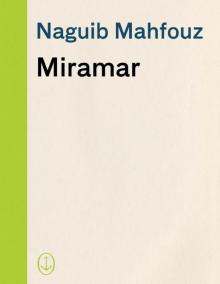 Miramar
Miramar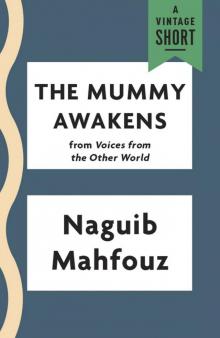 The Mummy Awakens
The Mummy Awakens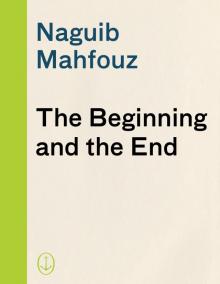 The Beginning and the End
The Beginning and the End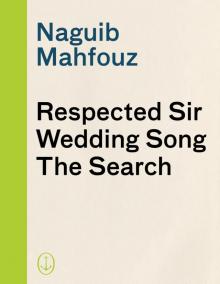 Respected Sir, Wedding Song, the Search
Respected Sir, Wedding Song, the Search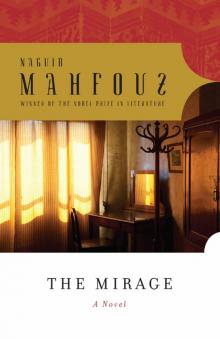 The Mirage
The Mirage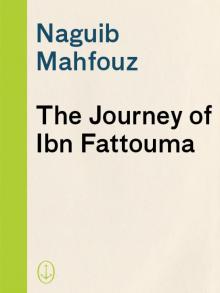 Novels by Naguib Mahfouz
Novels by Naguib Mahfouz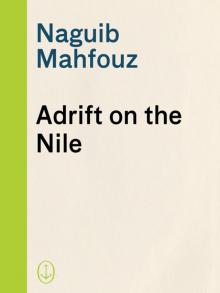 Adrift on the Nile
Adrift on the Nile Karnak Café
Karnak Café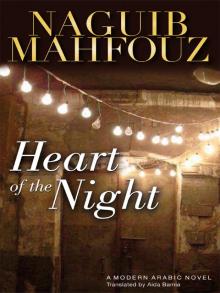 Heart of the Night
Heart of the Night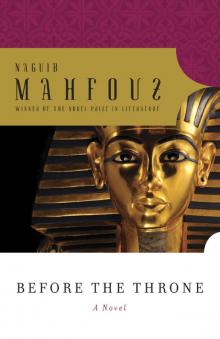 Before the Throne
Before the Throne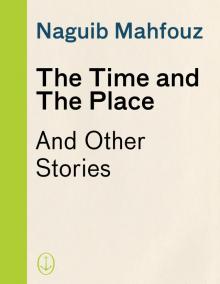 The Time and the Place: And Other Stories
The Time and the Place: And Other Stories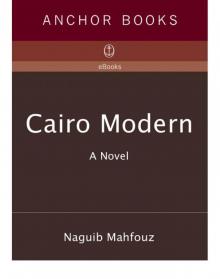 Cairo Modern
Cairo Modern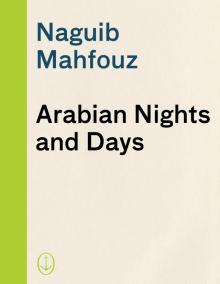 Arabian Nights and Days
Arabian Nights and Days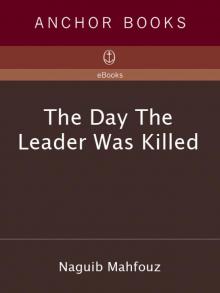 The Day the Leader Was Killed
The Day the Leader Was Killed Morning and Evening Talk
Morning and Evening Talk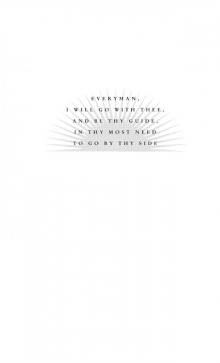 Three Novels of Ancient Egypt Khufu's Wisdom
Three Novels of Ancient Egypt Khufu's Wisdom Akhenaten: Dweller in Truth
Akhenaten: Dweller in Truth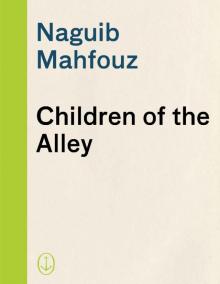 Children of the Alley
Children of the Alley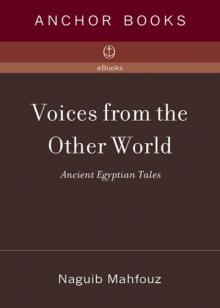 Voices From the Other World
Voices From the Other World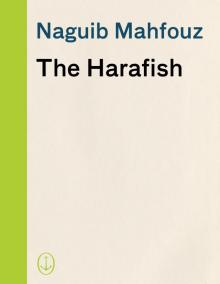 The Harafish
The Harafish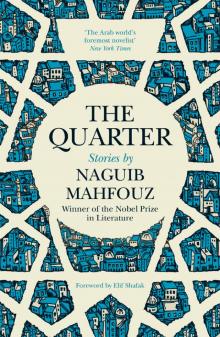 The Quarter
The Quarter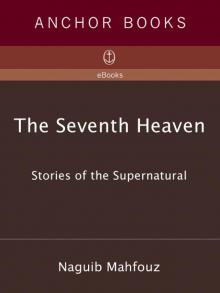 The Seventh Heaven: Supernatural Tales
The Seventh Heaven: Supernatural Tales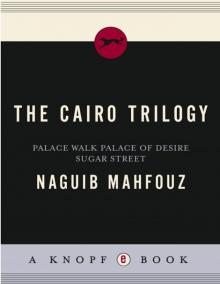 The Cairo Trilogy: Palace Walk, Palace of Desire, Sugar Street
The Cairo Trilogy: Palace Walk, Palace of Desire, Sugar Street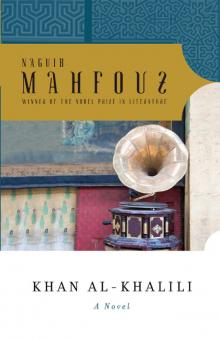 Khan Al-Khalili
Khan Al-Khalili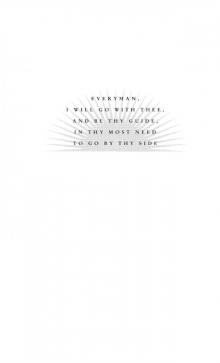 Three Novels of Ancient Egypt Khufu's Wisdom, Rhadopis of Nubia, Thebes at War
Three Novels of Ancient Egypt Khufu's Wisdom, Rhadopis of Nubia, Thebes at War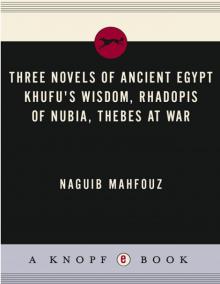 Three Novels of Ancient Egypt
Three Novels of Ancient Egypt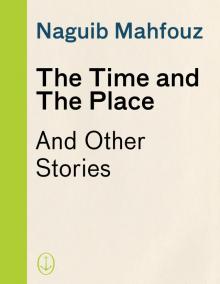 The Time and the Place
The Time and the Place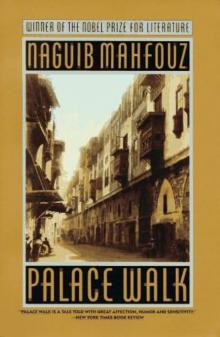 Palace Walk tct-1
Palace Walk tct-1 Akhenaten
Akhenaten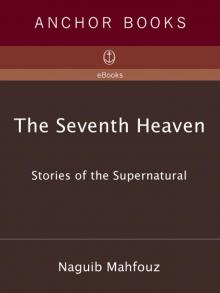 The Seventh Heaven
The Seventh Heaven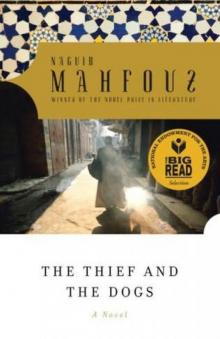 The Thief and the Dogs
The Thief and the Dogs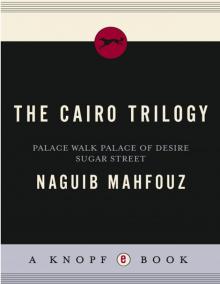 The Cairo Trilogy
The Cairo Trilogy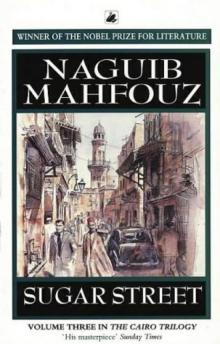 Sugar Street tct-3
Sugar Street tct-3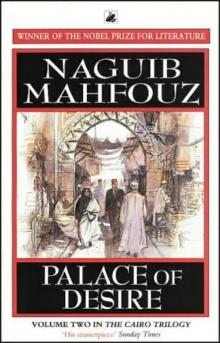 Palace of Desire tct-2
Palace of Desire tct-2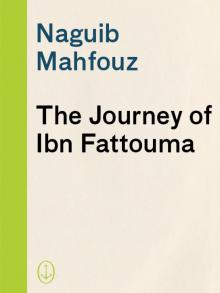 The Journey of Ibn Fattouma
The Journey of Ibn Fattouma